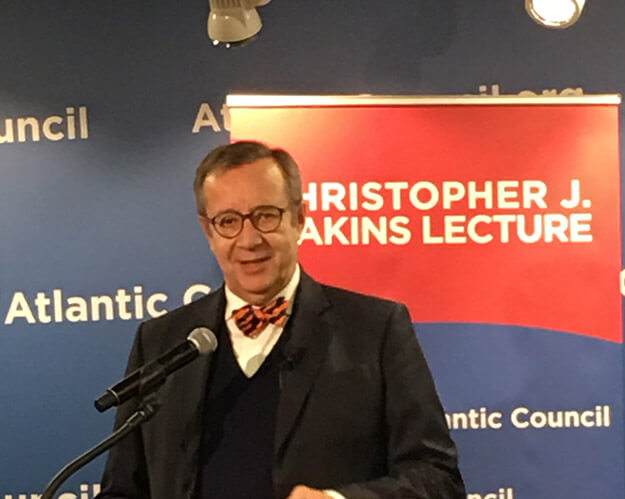 On 9 February 2017, President Toomas Hendrik Ilves presented the Christopher J. Makins lecture at the Atlantic Council headquarters in Washington, DC.
On 9 February 2017, President Toomas Hendrik Ilves presented the Christopher J. Makins lecture at the Atlantic Council headquarters in Washington, DC.
Established in 2005 to honor Christopher J. Makins’ service as president of the Atlantic Council, the lecture series constitutes the Council’s memorial to him, building upon his legacy of bringing extraordinary dynamism and rigorous analysis the to the challenges of transatlantic cooperation. Makins lecture has hosted some of the most prominent Atlanticists of our times, including Zbigniew Brzezinski, former Latvian President Vaira Vike-Freiberga, Henry Kissinger, Lord George Robertson, and General Brent Scowcroft.
President Ilves was introduced by Frederick Kempe, president and CEO of the Atlantic Council. Kempe emphasized that during his presidency Ilves invigorated Estonia to become a global leader in digital technology, internet access, and the use of online governance to promote openness and accountability. Kempe also reminded the audience of the many awards Ilves has received, the most recent one being the Bertelsmann Foundation’s Reinhard Mohn Prize for his work promoting digitalization of Estonia.
At the podium, President Ilves greeted many old friends and colleagues in the 100+ person audience. He began by stating that the basic truths of liberal democracy are being questioned in the West, the land of the free and home of democracy. He talked about a moment during John F. Kennedy’s “Ich bin ein Berliner” speech that moved his parents to tears and his realization of what America was about.
Continuing, Ilves reminded everyone that for the past 70 years, America has led the fight for freedom, building on the principles defined by John Locke, Thomases Jefferson and Paine, and John Stuart Mill. These have been the foundations for the enormous progress of the past 300 years.
However, the collapse of communism did not result in freedom for many of the countries in Eastern Europe. Twenty-five years after the fall of the wall, 80% of the populations in the Radio Free Europe – Radio Liberty broadcast area live in countries that are partially free or completely unfree, according the Freedom House index of freedom. The enlightenment values of liberal democracy are under attack, not only in Putin’s Russia but in the West as well. Elections are coming up in the Netherlands, Germany, France, and the Czech Republic, but voices of reason and tolerance are being drowned by fake news, by antidemocratic, often racist rhetoric. Ilves said that one of the greatest scientific creations of our time – the internet – has been turned against liberal democracy in ways that could not have been imagined when 30 years ago.
He was concerned about the present environment where not only fundamental freedoms, but also democracy, rule of law, and separation of church and state are under attack. the fact that Russian hacking, and fake news riling up anti-immigrant sentiment are benefitting anti-EU and anti-NATO candidates, are serious concerns. However, if you have free and fair elections and someone’s manipulating the information, then you better start worrying. If you can hack the elections and change the policies of a country, you don’t need to invade with tanks, troops and kinetic devices such as bombs and artillery.
Ilves emphasized that in this new digital age, we must renew our commitment to liberal democracy. He quoted Ronald Reagan who said, “Freedom is never more than one generation away from extinction. We didn’t pass it to our children in the bloodstream. It must be fought for, protected, and handed on for them to do the same.” In closing, Ilves emphasized once more that America matters, and that free Europe, meaning a Europe that is at peace and is whole – is because of U.S. leadership. He ended his lecture by paraphrasing John F. Kennedy: “Wir sind Amerikaner”, we are all Americans.
The post-lecture discussion, moderated by Susan Glasser, editor of POLITICO, included a wide variety of timely topics. These included: Ilves’ use of Twitter, cyberhacking by advanced persistent threats, Russia’s bullying and bilateral approach to treaties, NATO’s Article 5 and defense spending at 2% of GDP, Russian annexation of Crimea, Trump-Putin relationship, the strongest supporters of sanctions are countries most affected by the sanctions, dealing with internet security, secure identification for the internet, Estonian e-government and e-residency, combatting disinformation, and fake news on Facebook.
Completing an intellectually stimulating and informative evening was the reception that allowed informal discussions among the guests. As a closing note, the Atlantic Council is in the same building as the offices of the Estonian Embassy in 1993 when Ilves was ambassador.
Agu Ets
301-526-3327














